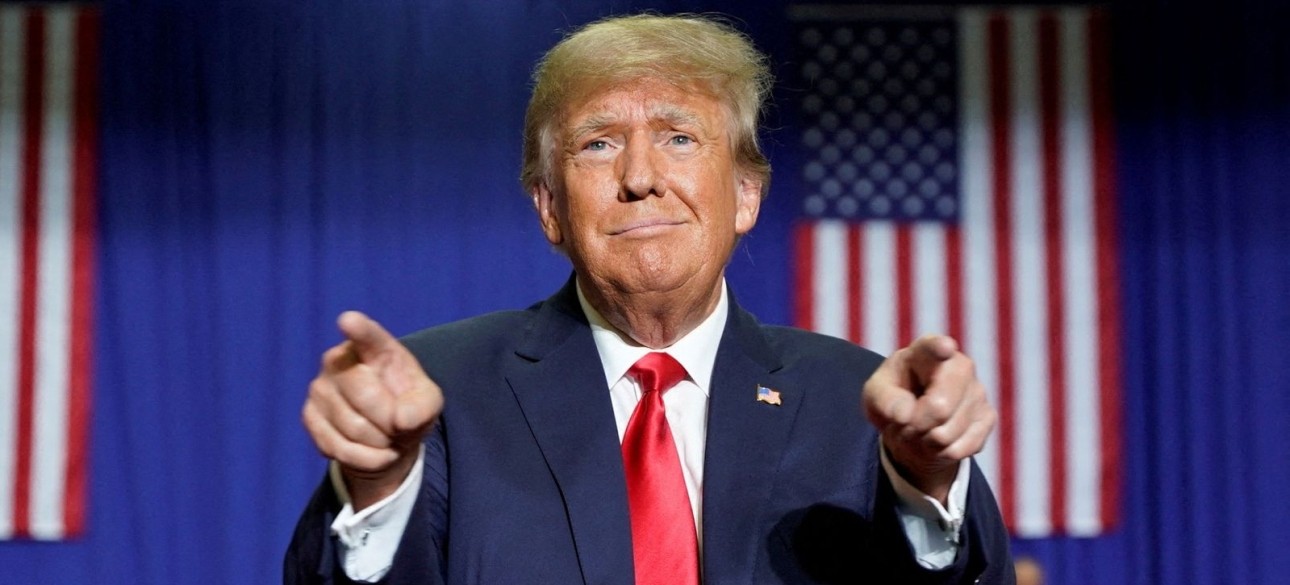
 By Eliza Popova
By Eliza Popova
Meanwhile, recent surveys show that Vice president Kamala Harris, a favorite for a candidate from a democratic party, is leg with Trump. However, the UK Prime Minister Kira Starmer has no other choice but to stay with the President of the United States, no matter who he is-hence the charm that happened to Trump a few months ago. The trick is that the older is a strong supporter of Ukraine.
Sitting to the right of President of Ukraine Volodymyr Zelensky at the European Political Community Summit, organized by the United Kingdom last week, the Prime Minister promised to support Kiev "as much as it will be needed. " But Trump's allies, such as Elbridge Kolby, who is called Trump's possible national security advisor, see the main threat to US security, not Russia, and they consider Ukraine as a distracted resource needed to confront China and protect Taiwan.
Earlier, Trump boasted that he could put an end to the war in Ukraine in 24 hours, although after a recent telephone conversation with Zelensky, he specified it, saying that "both parties will be able to gather together and agree on an agreement that would end the violence and pave the way forward to prosper ". But greater concern is that Trump's idea of peaceful settlement can simply mean that Russia will retain the territories of Ukraine that it holds.
He recently appointed his candidate for the post of Vice President Senator from Ohio JD Vens, a man who stated that she was indifferent to what was happening to Ukraine. Similarly, Richard Grenell - a possible Secretary of State at Trump - stands for a peace agreement for Ukraine, which will retain Ukrainian territory, but will allow the creation of "autonomous zones". This term may well mean that Ukraine simply accepts its losses and moves on.
In view of all this, if Trump returns to the White House, the United Kingdom and other European NATO members may be in a difficult choice: either to accept forced settlement in favor of Russia, or to support Zelensky in refusing such an agreement and continuing resistance to Russian aggression. In the latest scenario, Trump may withdraw US defense guarantees for allies, which, in his opinion, "escaped" the war, supplying weapons to Ukraine.
The possible crisis will divide and weaken NATO - as much as some allies can abandon confrontation with Russian President Vladimir Putin and stop Ukraine's support. The question of whether Britain will become one of these countries, will it join the coalition of European allies in NATO that support Ukraine? According to the older, the disobedience of Trump is likely to lead to the fact that "special relations" between the United Kingdom and the US will be brought to a critical point.
There may be a chance that this could be avoided if NATO's European members began to talk to Trump's potential advisers, such as Kolby and Granell, about a possible agreement that would allow them to continue supplying weapons to Ukraine. But even this does not guarantee anything. The truth is that even if the Democrat wins the White House in November, China's threat can in any case be completely displaced by Ukraine's further funding by the United States.
Then Zelensky will have to rely on European allies, as well as G7 loans, supported by income from frozen Russian assets. However, if Trump wins, his advisers are likely to say that the war in Ukraine just needs to be finished to prevent the US from being involved in it if Russia is taking action against NATO members who supply Ukraine.
And since Zelensky continues to demand from the Allies permission to use the weapons of long-standing action in the depths of Russia (which the old man refused when Zelensky recently visited him on Down Street), this risk is not fully fantastic. Colby, for its part, recognizes that the US has a strategic interest in Ukraine's defense, but only if it does not mean direct confrontation with Russia.
That is, part of the price that Trump will accept with the consent of the members of the European Alliance to continue supplying Ukraine, may be an obligation to prevent the use of these weapons for purposes within Russia. Although, as it is now, exceptions to goals in Russia near Ukraine's borders can not be drawn into a direct conflict with Russia for President Joe Biden, it will not happen to Trump.
But the fact remains: in the face of Putin's threats, which owns nuclear weapons, European allies will feel safe, supplying Ukraine, only if Trump retains the US affection for NATO. And it shows us another problem: Trump believes that European countries should do more to protect themselves, and as you know, he calls on Russia "to do whatever they take away, they want" with bloc members who do not pay the Alliance its fair share.
Therefore, with the arrival of Trump to power, the promises to increase defense costs should be part of any NATO country agreement to continue Ukraine's support. Colby was clear that, in his opinion, European allies should spend from 3 to 4 percent of GDP for defense. However, it is unlikely that some of the most important suppliers of military equipment of Ukraine-such as Belgium, France, Germany, the Netherlands and the United Kingdom-will spend at least 3 percent in the foreseeable future.
However, the cost of defense of European NATO members increases, at the same time Britain indicates a further increase in up to 2. 5 percent of GDP, and in 2025 Poland will even exceed it. Therefore, it is possible that the Allies may propose a formula that would convince Trump advisers that it should not impose a peace agreement for Ukraine, but may instead leave military support to the country to European allies, with some attachment to the goal. Zelensky, of course, will not like these lines.










All rights reserved IN-Ukraine.info - 2022